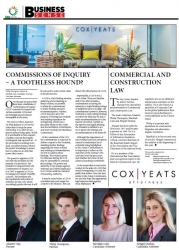Commissions Of Inquiry : A Toothless Hound?2019-03-04 Philip Thompson and Marikah Calo
Over the past six years there have been a multitude of Commissions of Inquiry ('COI') convened to inquire into various scandals. COIs steal the limelight and are almost inescapable in the news. We need to reflect, however, on what purpose a COI serves other than to keep the news interesting. It is, after all, tax payer's money being spent. While it is worthwhile to have matters of public concern thoroughly investigated and reported on - if the procedure is nothing more than a toothless hound, what is the point? Knowledge is power, but it is what we do with that power that counts. The power to appoint a COI lies with the president (or the premier of a province). The president is empowered by the Commissions of Inquiry Act 8 of 1947 to appoint a COI to investigate any matter of public concern. The president sets the regulations and points of reference for the COI, which accordingly guides the way it will be run and to some extent, what it should uncover. A COI is a fact-finding mission, gathering and evaluating as much evidence as possible to allow the commissioner to make findings and give recommendations. Further, a COI may also serve the purpose of healing past wounds and making reparation for wrongdoing, which was a prevalent theme in the Truth and Reconciliation Commission, and more recently, the Marikana Commission. At the conclusion of the COI, the commissioner is expected to deliver a report to the President, detailing his/her findings regarding the issues at hand and making recommendations on how to address those findings. The evidence given by witnesses during the COI may be admissible in criminal proceedings. The power and authority to lay charges against witnesses and others implicated in a COI lies with the National Prosecuting Authority. It may be years before a COI is concluded and even longer for a report to be released. This can thwart the effectiveness of a COI. Importantly, a COI is not a court of law. Those not familiar with COIs often mistake a commissioner as having the authority to make binding rulings or judgments akin to a judge. The commissioner's power is, however, restricted to only making findings on where the fault may lie and to make recommendations as to the manner of redress. Further, as the report is not legally binding, the President is entitled to act on or ignore the findings and recommendations as he deems fit. Although the importance of uncovering fraud and corruption cannot be understated (as is currently being highlighted in the Zondo Commission) it is important to reflect on the outcomes of the various COIs convened over the past years and whether they have in fact achieved anything worthwhile. To the extent that no real action is taken in the wake of a COI that reveals wrongdoing, it is only the public that suffers. Once the dust settles in the Zondo Commission, we can only hope that appropriate legal steps are taken against those implicated. They can be contacted on Tel: 031-536-8500 Email: pthompson@coxyeats.co.za mcalo@coxyeats.co.za http://www.coxyeats.co.za |
Commissions Of Inquiry : A Toothless Hound?
Copyright © 2026 KwaZulu-Natal Top Business
